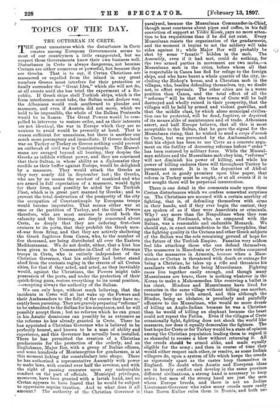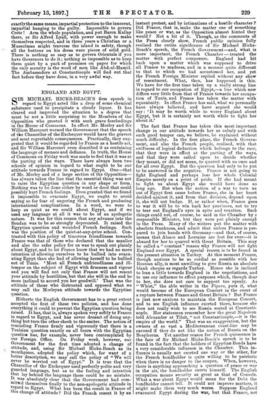TOPICS OF THE DAY.
THE OUTBREAK IN CRETE.
T"great uneasiness which the disturbance in Crete creates among European Governments seems to most of our countrymen a little exaggerated, but we suspect those Governments know their own business well. Disturbance in Crete is always dangerous, not because Cretans are either numerous or powerful, but because they are Greeks. That is to say, if Cretan Christians are • massacred or expelled from the island in any great • numbers Greece must interfere for their protection or finally surrender the "Great Idea," which she will not do, at all events until she has tried the experiment of a Re- public. If Greek ships shell Turkish ships, which is the form interference must take, the Sultan must declare war, the Albanians would rush southward to plunder and massacre, and even if Austria did not move, which we hold to be impossible, the whole of the Balkan Peninsula would be in flames. The Great Powers would be com- pelled to intervene to restore order, and as their interests are not identical, the war in Europe which they are so anxious to avoid would be presently at hand. That is reason sufficient for uneasiness, but there is another one much more peremptory and immediate. If Greece declared war on Turkey or Turkey on Greece nothing could prevent an outbreak of civil war in Constantinople. The Mussul- mans are enraged beyond all bearing, they despise the Greeks as infidels without power, and they are convinced that their Sultan, in whose ability as a diplomatist they confide as their buffer against Europe, would be delighted by a massacre. They would attack the Greeks as they very nearly did in September last ; the Greeks, who are by no means the meekest of mankind and who are armed in full expectation of a massacre, would fight for their lives, and possibly be aided by the Turkish Fleet, which is in great part manned by Greeks ; and to prevent the total destruction of the prosperity of the city the occupation of Constantinople by European troops would become imperative. That means either war at once or the partition of Turkey, and the Great Powers therefore, who are most anxious to avoid both the calamity and the blessing, are deeply concerned about Crete, so deeply that they are ordering first-class cruisers to its ports, that they prohibit the Greek men- of-war from firing, and that they are actively sheltering the Greek fugitives from Canea, who, to the number of five thousand, are being distributed all over the Eastern Mediterranean. We do not doubt, either, that a hint has been given to the Commander-in-Chief of the Ottoman troops in Crete, who is entirely independent of the Christian Governor, that his soldiery had better stand aloof from the contests raging in the streets of all Cretan cities, for that if they acted, and acted, as they inevitably would, against the Christians, the Powers might take possession of the ports, and under the protection of their quick-firing guns, restore everything to its usual position, —excepting always the authority of the Sultan.
We can only hope, without much believing, that the incidents in Crete will at last wake up the Powers and their Ambassadors to the folly of the course they have re- cently been pursuing. They are gravely preparing "reforms" to be submitted to the Sultan for his acceptance, and he will possibly accept them ; but no reforms which he can grant in his Asiatic dominions can possibly be as extensive as the reforms he has already granted in Crete. There he has appointed a Christian Governor who is believed to be perfectly honest, and known to be a man of ability and experience, and this Governor has actually been installed. . There he has permitted the creation of a Christian gendarmerie for the protection of the orderly, and an Englishman, Major Bor, with a group of Italian officers, and some hundreds of Montenegrins for gendarmes, is at this moment licking the constabulary into shape. There he has authorised a representative Assembly with power to make laws, with control over half the revenue, and with the right of passing censures upon any undesirable conduct on the part of officials. Municipal privileges, moreover, have been granted with a lavish hand, and no Cretan appears to have feared that he would be subject to oppressive regular taxation. And to what does it all amount ? The authority of the Christian Governor is paralysed, because the Mussulman Commander-in-Chief, though most courteous about pipes and coffee, in his full conviction of support at Yildiz Kiosk, pays no more atten- tion to his requisitions than if he did not exist. Every Mussulman resists the organisation of the gendarmerie, and the moment it begins to act the soldiery will take sides against it ; while Major Bor will probably be shot by some " fanatic " hidden in the mob. The Assembly, even if it had met, could do nothing, for the two armed parties in movement are two mobs,—a. Mussulman mob in the cities, before whom all that is respectable in Canea has fled for refuge to the foreign ships, and who have burnt a whole quarter of the city, in- cluding the Bishop's house, and a Christian mob in the villages, who, besides defending themselves, try, we doubt not, to effect reprisals. The other cities are in a worse position than Canea, and the total effect of all the " reforms " will be that the towns of Crete will be half destroyed and wholly ruined in their prosperity, that the villages will be held by armed and violent guerillas, and that the middle class, by which alone municipal civilisa- tion can be protected, will be dead, fugitive, or deprived of its means alike of maintenance and of trade. Athenians assert, and half Europe believes, that all this is most acceptable to the Sultan, that he gave the signal for the Mussulman rising, that he wished to send a corps d'armie to Crete, but was prevented by the Ambassadors, and that his object has been to use Crete as a concrete argu- ment on the futility of decreeing reforms before " order " has been restored by military force. While the Mussul- man soldiers and the Mussulman mob obey him, "reforms" will not diminish his power of killing, and while his power of killing endures there will throughout Turkey be permanent unrest. It is in the deposition of Abd-ul Hamid, not in goody promises upon blue paper, that reform in Turkey must be sought, or at all events if it is not sought there will be perpetual insurrection.
There is one detail in the comments made upon these Cretan disturbances which we confess somewhat surprises us. The Christians are accused with a certain acerbity of fighting, that is, of defending themselves with arms in their bands, and if they ever begin the contest, they are spoken of as if they were Anarchists or criminals. Why ? any more than the Neapolitans when they rose against King Ferdinand, who, as compared with the Sultan, was a reasonable and endurable Monarch. We should say, in exact contradiction to the Turcophiles, that the fighting quality in the Cretans and other Greek subjects of the Sultan was the sole remaining ground of hope for the future of the Turkish Empire. Fanatics very seldom feel like attacking those who can defend themselves. The massacres in Macedonia or Crete are trifles compared with the massacres in Armenia, because when a Mace- donian or Cretan is threatened with death or outrage for being a Christian, he takes up a rifle and threatens his assailants with death for being Mussulmans. Fighting races live together easily enough, and though many Mussulmans are brave, there is nothing whatever in the Koran to make a Mahommedan like receiving a bullet in his chest. Hindoos and Mussulmans have lived for centuries in the same village without killing one another, because they are both armed, and this although the Hindoo, being an idolator, is peculiarly and painfully offensive to the Mussulman, who would no more dream of killing an Anglo-Indian because he was a Christian than he would of killing an elephant because the beast could not repeat the Fatiha. Even if the villages of Crete occasionally fight, fighting does not shock the world like massacre, nor does it equally demoralise the fighters. The best hope for Crete or for Turkey would be a state of opinion among the Christian population leading them to regard it as shameful to receive a blow without returning it. All the creeds should be armed alike, and made equally eligible for the army ; and then in course of time they would either respect each other, or resolve, as some Indian villagers do, upon a system of life which keeps the creeds as rigorously apart as the castes keep themselves in England. No doubt when Asiatic and European ideas are in hourly conflict and develop in the same province different civilisations, a strong hand is necessary to keep order; but men of the strong hand are just the men whom Europe breeds, and there is not an Indian Lieutenant-Governor who rules many creeds more easily than Baron Kallav rules them in Bosnia, and both use exactly the same means, impartial protection to the innocent, impartial hanging to the guilty. Impossible to govern Crete ! Arm the whole population, and put Baron Kelley there, or Sir Alfred Lyall, with power enough to make themselves respected, and in three years a Christian or a Mussulman might traverse the island in safety, though all the buttons on his dress were pieces of solid gold. There is nothing so easy as to govern Orientals if you have Governors to do it ; nothing so impossible as to keep them quiet by a pack of promises on paper for which the only security is the word of men like Abd-ul-Hamid. The Ambassadors at Constantinople will find out that fact before they have done, in a very awful way.



































 Previous page
Previous page